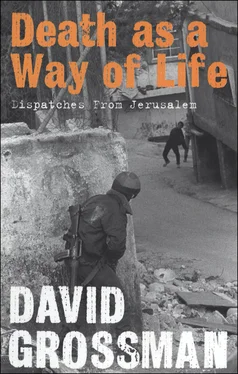David Grossman - Death as a Way of Life
Здесь есть возможность читать онлайн «David Grossman - Death as a Way of Life» весь текст электронной книги совершенно бесплатно (целиком полную версию без сокращений). В некоторых случаях можно слушать аудио, скачать через торрент в формате fb2 и присутствует краткое содержание. Год выпуска: 2013, Издательство: Bloomsbury Publishing, Жанр: Прочая документальная литература, на английском языке. Описание произведения, (предисловие) а так же отзывы посетителей доступны на портале библиотеки ЛибКат.
- Название:Death as a Way of Life
- Автор:
- Издательство:Bloomsbury Publishing
- Жанр:
- Год:2013
- ISBN:нет данных
- Рейтинг книги:5 / 5. Голосов: 1
-
Избранное:Добавить в избранное
- Отзывы:
-
Ваша оценка:
- 100
- 1
- 2
- 3
- 4
- 5
Death as a Way of Life: краткое содержание, описание и аннотация
Предлагаем к чтению аннотацию, описание, краткое содержание или предисловие (зависит от того, что написал сам автор книги «Death as a Way of Life»). Если вы не нашли необходимую информацию о книге — напишите в комментариях, мы постараемся отыскать её.
Death as a Way of Life — читать онлайн бесплатно полную книгу (весь текст) целиком
Ниже представлен текст книги, разбитый по страницам. Система сохранения места последней прочитанной страницы, позволяет с удобством читать онлайн бесплатно книгу «Death as a Way of Life», без необходимости каждый раз заново искать на чём Вы остановились. Поставьте закладку, и сможете в любой момент перейти на страницу, на которой закончили чтение.
Интервал:
Закладка:
As for the Palestinians, when they declare that as far as they are concerned there is no difference between Sharon and Barak, they know full well how significant the difference is and what the outcome will be. This might be the reason why the Palestinians hurried, in the two weeks leading up to the Israeli elections, toward a compromise with Israel at the Taba talks. It is unfortunate that this zeal was not evident in the preceding weeks or months. It is also unfortunate that Arafat did not succeed in taking control of his people. He could have channeled the authentic vitality of the early Intifada into reaching an agreement while Barak was still in power. Palestinian terrorists murdered dozens of innocent Israelis, women and children among them, during the election campaign. Each funeral, each orphan’s tears, supposedly proved to the Israeli public that Barak had erred in agreeing to compromises. The public was practically pushed into the arms of the man who promised them he would not negotiate under fire. The despair and anxiety that possessed Israelis — and their total lack of awareness of Palestinian pain and suffering — are the reasons for Sharon’s rise to power.
What is obvious from these elections is that the Israeli public is not yet ready for peace. Israelis crave peace, of course, but they are not yet able to pay the heavy price that such an agreement requires. As for the Palestinians, they too, apparently, have not yet internalized the need for the painful compromises that peace requires. It is impossible to predict how we can get out of this impasse without another round of violence.
Fairness requires that we give Sharon a chance to prove that he is right. But there is a heavy, glum feeling in my heart. It is one thing to report about a train running off the tracks from a vantage point to the side. It is entirely another experience to report it from inside the train.
Death as a Way of Life
May 2001
The horrible thing that’s happening to Israelis is that they’re getting used to it. They’re used to waking up in the morning and hearing about the terrorist attack that happened at dawn. They’re used to the sight of their injured and dead. Used to the stock phrases about the situation, to the formulaic photographs and news. They’ve gotten so used to it that their emotions sometimes also seem like clichés. Like something that could be put into a compact, blaring newspaper headline in one of the tabloids: ANGUISH AND ANGER! or FEAR AND LOATHING!
There seems to be no way out, to the point that a person doesn’t dare, sometimes, to feel anything more than what the headlines proclaim. He dreads that introspection might reveal emotions even more disconcerting and menacing. He dreads that they will kindle disquieting questions about the justice of his actions, or his chances of living, even for a single day, a life of serenity, a life in which he will cause injustice to no one and will fear no other.
Most Israelis now believe that the peace process has dissolved and become part of history. Even worse, most of them now believe that it was a mirage from the very beginning. They even have trouble understanding how they allowed themselves to be led on by the left and by the Barak government, which deluded them into believing that Israel really had a negotiating partner and that the Palestinians had really given up their dream of destroying Israel.
Israel has plunged into a kind of apathy. Seemingly, life goes on as usual. Everyday affairs are conducted with the characteristic Israeli mixture of vigor and edginess. But as anyone who has lived here all his life knows, everything has a strange and disheartening kind of impassivity. Life in slow motion. Israel is now slipping back into the psychological stance that is most dangerous for itself — the stance of the victim, of the persecuted Jew. Almost every threat to it — even from the Palestinians, who can never defeat Israel on the battlefield — is perceived as an absolute peril justifying the harshest response.
Unlike at other, similar difficult periods in the past, it appears as if Israelis no longer have any hope. Only hope can impel them to try to extricate themselves from this fatal ossification. The prophecy is liable to fulfill itself. “You can’t make peace with the Arabs” is a statement I hear very often, every time I foolishly get into a debate on the street, in a taxi, or on a radio program. With one small difference, it is the same statement one hears in debates with Palestinians: “You can’t make peace with the Israelis.”
The war is taking place almost everywhere in Israel (at this very moment, as I write, I can hear the rumble of the Israeli incursion into Palestinian Beit Jala, ten kilometers due south of my home in a Jerusalem suburb). Despite this, the average Israeli seems to be able to repress what is happening around him and, in a strange way, is almost able to ignore it. It’s hardly surprising — decades of wars and anxiety have trained him to do this very efficiently. When an Israeli citizen opens his eyes in the morning, he can assume, with a high degree of certainty, that during the course of the day at least one Israeli will be hurt in an attack of some sort. He knows that his life could change in the bitterest possible way. He won’t think about it. Nor will he think about what the Palestinians are feeling (it’s all their fault anyway, the average Israeli believes — we offered them everything and they responded with lynches and terrorism). He won’t go to crowded places. He’ll refrain from hiking his favorite trails, avoid taking roads previously attacked. He contracts himself a little, but no more. He notes that downtowns look empty and bleak. That there are almost no tourists in the streets, and sometimes more policemen and soldiers than civilians. He gets used to that, too. In the evening, in front of the TV news, after the segment on the day’s funerals in Tel Aviv and Gaza, a little voice in his head whispers, “Fortunately, it wasn’t me today.”
Gradually, Israelis and Palestinians are moving further away from peace. Just three months ago, in February 2001, at the talks in Taba, an agreement was imminent. Today that looks like a remission, brief and delusional, in the course of an incurable disease. Now almost no one uses the word “peace.” The Palestinians say they won’t end their violence “until the occupation is completely over.” Israel declares that it will not even enter negotiations “until violence comes to a complete halt.” Each side knows that its ultimatum — even if morally correct — is unrealistic. Furthermore, both know that if they adhere to these demands they will be caught in continuous violence and that finally they will bring destruction on themselves. The occupation will go on, and the violence will not end (quite the opposite!). In any case, with a kind of numbing of the senses, they do nothing to save themselves from this nightmare.
Since there is no hope, Israelis and Palestinians go back to doing what they do — shedding the blood of each other. Each day more people join the ranks of the dead and wounded, of the haters and the despondent. Each day the appetite for revenge grows. The Palestinians say, before camera and microphone, that they no longer care if there is never an agreement. “The main thing is for the Israelis to suffer as we have suffered.” Israelis demand that Prime Minister Sharon “rub out a few Palestinian villages” and believe, so it seems, that this will make the Palestinians surrender and agree to an Israeli compromise.
Senior Palestinian officials, who in private conversations with Israelis severely criticize Arafat and the blind slaughter committed by suicide bombers, close ranks with the most extreme elements in their society when they speak in public. The voice of Israel’s left wing has gone almost completely mute — many have given up and have decamped to the right, while others realize that their views just don’t resonate with the public at large. Indeed, what influence can ideas and words have in the face of the brutal, all-pervasive reality that eats away at hope like acid?
Читать дальшеИнтервал:
Закладка:
Похожие книги на «Death as a Way of Life»
Представляем Вашему вниманию похожие книги на «Death as a Way of Life» списком для выбора. Мы отобрали схожую по названию и смыслу литературу в надежде предоставить читателям больше вариантов отыскать новые, интересные, ещё непрочитанные произведения.
Обсуждение, отзывы о книге «Death as a Way of Life» и просто собственные мнения читателей. Оставьте ваши комментарии, напишите, что Вы думаете о произведении, его смысле или главных героях. Укажите что конкретно понравилось, а что нет, и почему Вы так считаете.












